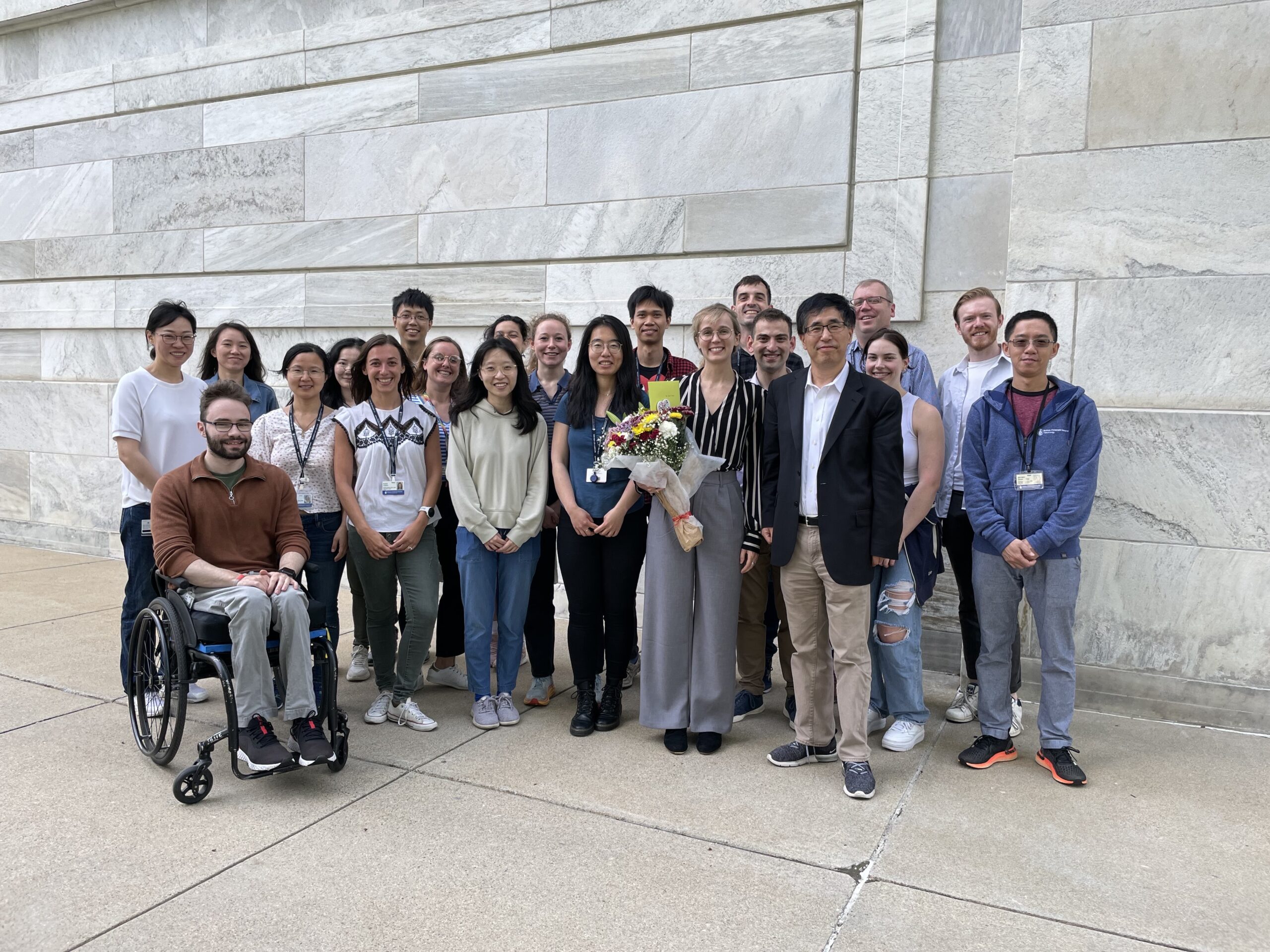Lab News
December 14, 2023
New Nature Paper Describing Mouse Spinal Projecting Neuron Atlas
Today a study led by Drs. Carla Winter, Anne Jacobi, and Junfeng Su in our lab was published in Nature as part of a collection of papers for the Brain Initiative Cell Census Network 2.0. Utilizing virus-mediated retrograde labeling and snRNA-seq, our study presents a detailed atlas of spinal projecting neurons (SPNs), categorizing them into 3 divisions, 13 subclasses, and 76 types across key brain regions. This taxonomy reveals distinct transcriptomic and anatomical characteristics of SPNs, highlighting their diverse roles in connecting the brain to the spinal cord. By establishing a baseline map of spinal projecting neurons through our study, we can now investigate how spinal cord injuries or stroke affect these diverse neural pathways, potentially leading to the development of targeted therapies.
Read the study here: https://www.nature.com/articles/s41586-023-06817-8#Sec59
See the immersive collection of studies here: https://www.nature.com/immersive/d42859-023-00069-2/index.html
See an article featuring our study by the Allen Institute here: https://alleninstitute.org/news/scientists-unveil-first-complete-cellular-map-of-adult-mouse-brain

June 13, 2023
Carla Winter successfully defended her Ph.D. thesis
Congratulations to Carla Winter for her successful thesis defense in her MD-PHD (Harvard BBS program)! She has done an amazing job in the past four years investigating the function of spinal projecting neurons. From now on, we will call her Dr. Winter!
March 14, 2023
Congratulations to Anne and Feng for their new position
Congratulations to Anne for her new position at Switzerland, and congratulations to Feng to be a new PI at Harvard Medical School!
July 14, 2022
Yu Zhang wins the 2022 KIRBY CENTER Ping Pong Tournament
Congratulations to Yu Zhang for being the winner of the 2022 Ping Pong Tournament in F.M. Kirby Neurobiology Center.
October 18, 2021
Zhigang He elected to National Academy of Medicine
The National Academy of Medicine announced its new members and Zhigang He, MD, PHD was elected for his breakthrough discoveries regarding the mechanisms of axon regeneration and functional repair following central nervous system injuries, providing foundational knowledge and molecular targets for developing restorative therapies to treat spinal cord injury, stroke, glaucoma, and other neurodegenerative disorders.
Election to the Academy is considered one of the highest honors in the fields of health and medicine and recognizes individuals who have demonstrated outstanding professional achievement and commitment to service. Congratulations Dr. He!
READ MORE >
May 5, 2021
Non-Invasive Treatments for Spinal Cord Injury
Neural circuits entirely within the spinal cord can control key aspects of locomotion. Even when there is a severe spinal cord injury (SCI) and the connections with the brain are totally broken, these internal circuits, or propriospinal network, may be structurally intact – so why not somehow take advantage of this remaining intraspinal circuitry to help people with SCI? A major technical challenge is how to efficiently target these widely distributed propriospinal neurons.
FEBRUARY 18, 2021
Carla Winter is a winner of the 2020 Beauty of the Brain Image Contest
Congratulations to Carla Winter for being a winner of the 2020 Beauty of the Brain Image Contest by Harvard Brain Science Initiative.
DECEMBER 3, 2020
Zhigang He wins Greenberg Prize for ending blindness by 2020
WASHINGTON, Dec. 3, 2020 /PRNewswire/ — End Blindness 2020—an unprecedented joint effort by leading scientists and figures from the worlds of business, politics, culture, art, music and entertainment to rid the world of blindness—is about to mark a major milestone. On December 14, 2020, 13 pioneering scientists will share $3 million in prizes, from The Sanford and Sue Greenberg Prize to End Blindness, for their groundbreaking scientific and medical contributions to permanently and universally eradicate a condition that has plagued humans since the beginning of time. The hour-long streamed ceremony will be freely accessible and open to all at www.EndBlindness2020.com.
NOVEMBER, 2019
Zhigang He receives 2019 Reeve-Irvine Research Medal
The Reeve-Irvine Research Medal recognizes an individual, or individuals, who have made highly meritorious scientific contributions in the area of spinal cord repair, and whose research has stood the test of time and scrutiny. The medal includes a $50,000 cash award generously provided by Joan Irvine Smith and the Athalie R. Clarke Foundation. Their kindness has made it possible to continue to recognize the work of pioneering investigators whose work has brought us closer to cures for afflictions affecting the spinal cord. The 20th Reeve-Irvine Research Medal is awarded to Dr. Zhigang He for his critical contributions to promoting axonal plasticity and regeneration after spinal cord injury .
NOVEMBER 4, 2020
Myelin Restored on Regenerated Optic Nerve Fibers of Mice in Study
Using a two-pronged approach, researchers were able to restore myelin on regenerated nerve fibers in a mouse model of optic nerve injury, which has implications for multiple sclerosis (MS) and other diseases associated with myelin loss, a study reported.
The study, “Robust Myelination of Regenerated Axons Induced by Combined Manipulations of GPR17 and Microglia,” was published in the journal Neuron.
The hallmark of MS is the loss of the myelin sheath — a fatty protective coating surrounding the fibers, or axons, of nerve cells (neurons). Without myelin, electrical impulses traveling along axons are slower and less efficient, leading to nerve cell degeneration in the central nervous system (CNS, brain and spinal cord) and a range of disease symptoms.
SEPTEMBER 19, 2019
NIH to investigate minor cannabinoids and terpenes for potential pain-relieving properties
Despite a lack of robust evidence, cannabinoids — such as CBD — are often assumed to be safe and effective in managing pain and used for such purposes in real-world settings. Now, nine new research awards totaling approximately $3 million will investigate the potential pain-relieving properties and mechanisms of actions of the diverse phytochemicals in cannabis, including both minor cannabinoids and terpenes. These awards, funded by the National Center for Complementary and Integrative Health (NCCIH), part of the National Institutes of Health (NIH), will strengthen the evidence regarding cannabis components and whether they have potential roles in pain management.

